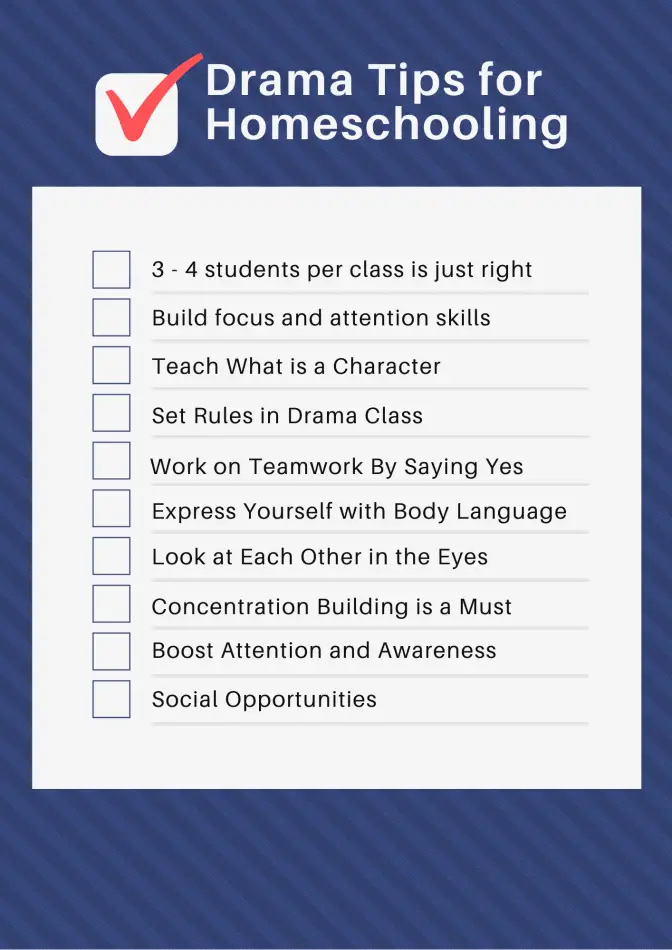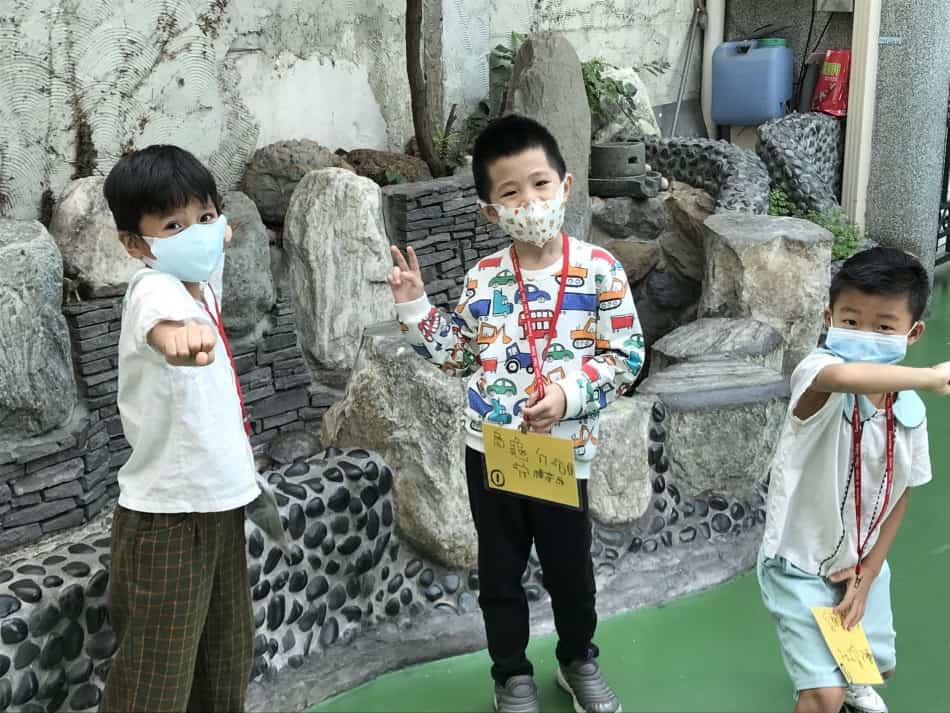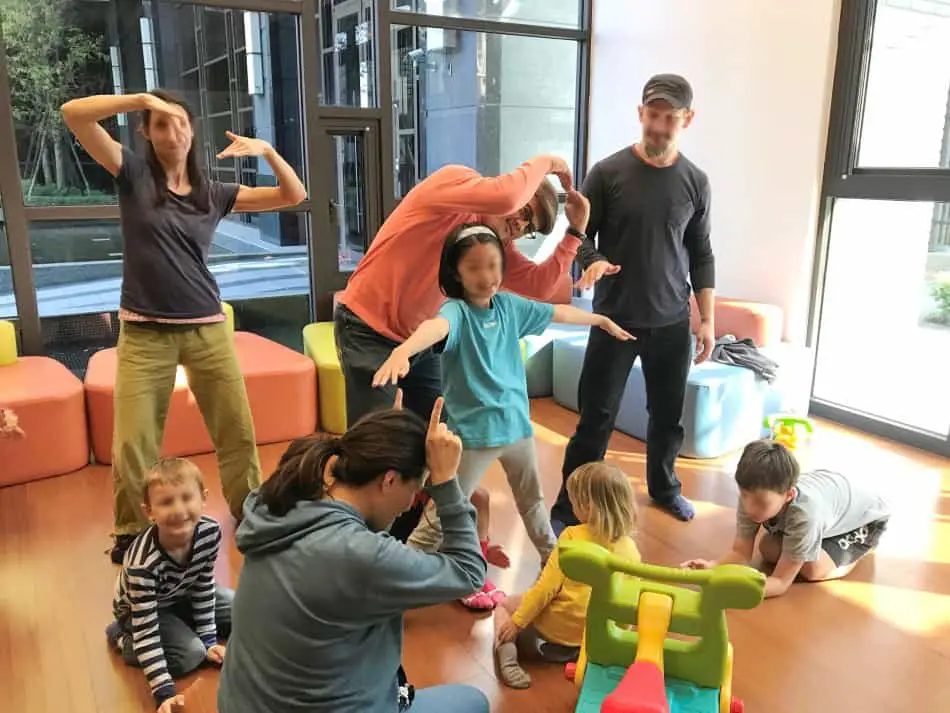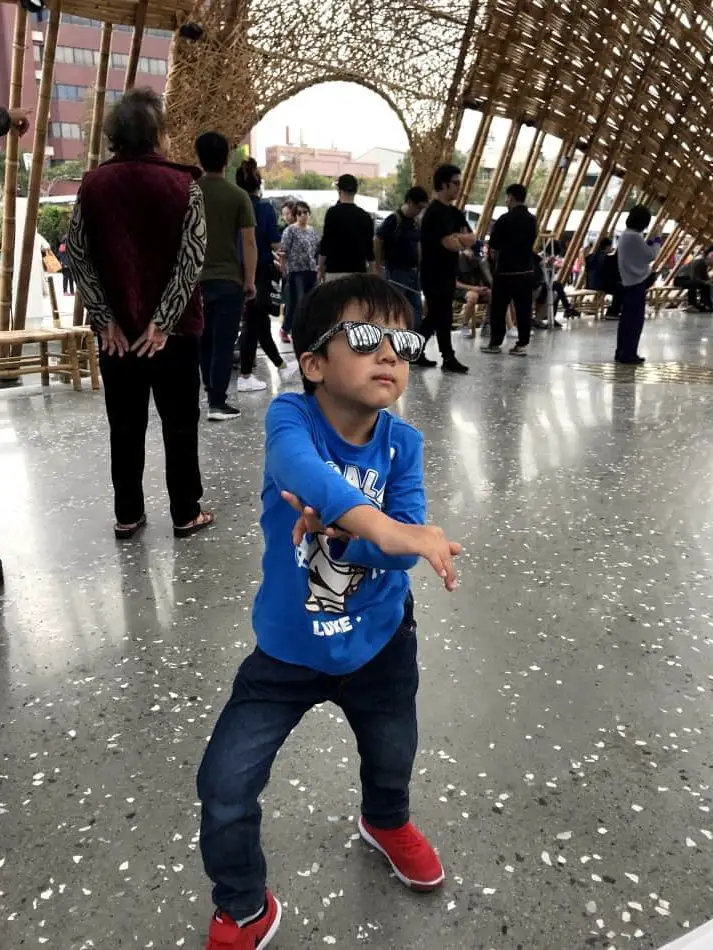This post contains affiliate links.
Wouldn’t you love to see your kid on stage performing in a drama performance or acting? How about doing drama in homeschool? We think anyone can do drama in their homeschool.
You can easily homeschool drama by firstly organizing at least 3 other students to do a drama class together. Then start exercises to prepare focus and attention. Next, teach the basics of storytelling to your homeschoolers. Lastly, work on concentration, listening, and expressing themselves.
We are very lucky to know a local improv and drama teacher who also does homeschooling. They arranged a class to meet weekly with 3 other families and this size seems right to work as a small team for storytelling and drama skills.

3 or 4 students per drama class is just right
The drama class we are in with our son has 4 students and it seems a perfect size because the teacher can focus us all and control it well. Depending on if you have older students or younger even in elementary school, this should not make much difference. When you are doing drama class in homeschool you also probably don’t have much space and there may not be many students interested. But that doesn’t matter because 3-4 per class is a perfect size. Imagine trying to work on concentration skills with 10-15 screaming toddlers or wild teenagers!
“The advantages of this very small drama class included efficiency in decision-making, a group focus conveniently doubled up as the class focus, the content was taught swiftly leaving ample time for exam revision, students received plenty of teacher advice and assistance”
Class Sizes Matter in Drama
Build focus and attention skills for acting and drama

If you are new to acting or drama one of the most important things to build on is attention skills. In our small class of 4 students, it’s just the perfect size to work on these kinds of skills. Why is this important you might ask? In drama, you must listen carefully to other actors’ lines and actions because you are all working as a team. And your lines might be next! If you don’t hear the others you might miss your part! We also work on activities and games where we also make sure to look at others in the eyes. This also can help kids of all ages to pay close attention to others.
The first activity we do is to introduce ourselves in a circle with us doing a silly pose or action and saying, “Hello, I’m Robert”. The circles in drama in the homeschool are a natural way to work together and this gets everyone warmed up and familiar with each other. Another game we do is to clap and look at each other in the eyes one pair at a time. And we have to do it in unison. Then the one person turns to the next in the circle and claps in unison again with the next in the circle. Once we get good we can do it around the circle very fast and uniformly.
Check out some other excellent and helpful examples on this page as well.
15 Games & Exercises to Improve Acting Skills (Taught In Drama Schools)
Teach What a Character is in a Story
In your homeschool drama class, you can start with the basics like teaching what a character is in a story. A simple way we start is with an activity where we circle up and start like this. Once upon a time, there was a lizard named Lonny who liked to fly! The main point is that the character has to be something living and has a name. And most importantly he has to want something. This about almost any story, this is how they always start with the main character who wants something or wants to do something. That’s how the journey starts in a beginners drama class.
Next, you will want to build the character up by emphasizing or elaborating on the actions around what he wants. No matter if you have older or younger kids stories are always fun to make up as you go, so have fun with it. The emotional side of the class should be light and fun, then your students will be able to relax and learn more readily. Just remember the most important part about a character is that it has to be able to think, act, or do something in the story to make it more fun. You can check out this video below to get some helpful tips about a character in a story.
Story Elements For Kids: What Is a Character?
Lay the Ground Rules in Drama Class
You have to lay the ground rules pretty early in your drama class to promote order and ensure your kids able to concentrate on your instructions. And when you are all moving around and having fun, you must be careful they understand how to stay safe and not get injured. Some of the games and activities will require you to move around quickly, so they need to be careful to keep from getting too wild! We encourage openness, creativity, and expression, but within reason!
In our class, the instructor reminds us to keep 3 things in mind. Firstly, we must all listen to him at all times. He is like our coach and we are all team players. We all perform our duties smoothly and we can learn and have fun at the same time. Next, he makes us pay attention to our safety, and others in our group. Keep everyone safe from getting hurt when we are jumping, running, or acting something out in an expressive way with our bodies. And lastly, keep the room in good condition and not break anything or create a mess. This is all probably similar to any classroom, but in drama, we want to emphasize attention, listening, and respect like on a sports team.
Work on Teamwork in Acting By Saying Yes

One thing we stress in drama class in our homeschool routine is to always say yes and work on teamwork. Why does this matter you might ask? Imagine that we are playing a story-building exercise. If the student before your turn says something you think doesn’t make logical sense or you don’t like their story, then the whole flow might just stop there. What? The lizard’s name is Lonny? Why did you name him Lonny? Well, in this exercise you might be practicing adding one more thing to the story based on the previous input. If you just stop and ask the question, this breaks the flow! See some important benefits from this article describing how students perceived their drama class experience.
Just say yes, in your mind and go with the flow of the story and build. This is also how you work on teamwork with your other drama members. In homeschool drama, you might be with kids of slightly different ages so there might be some weird or funny ideas coming out. So just say yes and go with the flow. If everyone thought about every detail and stopped the flow of the activities or games, then that wouldn’t be much fun. This is how you keep in sync as you learn and progress in drama class. In homeschool, you might not get many chances to build teamwork so the drama classes can provide this important lesson in your routine.
Expressing Yourself with Body Language

To understand ourselves and others, we humans rely on body language and expression to convey our inner feelings. We can build this expressive language with homeschool drama classes. We find many articles on drama therapy that help students in their life. We use and encourage the students in the drama class to open their minds and clearly express their emotions and have specific games for it. For example, there is a game our instructor played like this. He would say that now we are to choose an animal and we have to act sad.
So everyone walked around the room and focused on being sad with their movements, sounds, and motions. No speaking is required. Then he would say ok, now we are happy and we would then act out our interpretation of being happy. We could see many different ways kids express themselves with emotion. The parents were also asked to participate in the class. The instructor said that it was best the kids saw us also participate and not just observe as this would help them feel more at “home” and open up. We can all act silly together and have fun.
“The drama process seemed to help emotional expression and awareness and to foster a transformation of emotive processes in the sense of a “collective ER.” The importance of teacher awareness of students’ dominant emotional state and its potential impact on learning was emphasized.”
Science Direct
Looking at Each Other in the Eyes

Looking at each other in the eyes is something you must teach your homeschool drama students because eye contact is critical to connecting with people and your audience. This has implications not just in drama but in any encounter you or your child has with others. Do they teach this in traditional schools? Not likely! As a homeschooler, you are lucky because you can work on these important life skills in a homeschool drama class. In any drama class, this is a critical part of their training and working with other actors. Check out this helpful article from Backstage.com that goes in-depth about eye contact for actors.
We mentioned earlier that you can do one particular game where we first circle up. It starts with 1 designated person. And then they look to the person to their right. As they are both looking directly in the eyes with each other, one person says their name and they both try to clap in unison. The purpose of this exercise is to train our students to pay attention and look at each other in the eyes. And the second thing we want to emphasize is concentration, teamwork, and doing things in sync. You can practice this game a few times until everyone can go around the circle very smoothly and quickly in unison.
Concentration Building in Drama Class in a Must
One fun concentration-building activity we do is a drawing exercise in pairs. This is where we each are responsible to make one mark on the paper to draw in this particular game face. After each person makes a part of the face whenever their pencil lives up there finished and the partner has to take over. When either team member feels the face is completed, they will mark one letter below the face. And then the next person will write another letter and this is completed until one team member feels they’ve come up with this face’s name and underlines it.
In this game, each partner must concentrate on the task at hand which is drawing a face. And they will also have to put any doubts aside and follow the cue from their partner. For example, a partner might draw a big circle that represents the head. And the next partner might naturally draw one eye. And then the other partner might naturally want to draw another eye. And this continues and can be as complex or is simple depending on the teamwork and concentration. This is a great way to build concentration, teamwork, and camaraderie in the homeschool drama class. When you’re done you come up with each team’s finished face and they can describe it and present their work in front of the other team members and it’s a lot of fun.
Build Listening Skills to Boost Attention and Awareness
One fun game our instructor does with us is to build our listening skills and boost our attention to the details. We have to be aware of what others are saying specifically before and after we say something. In a play or any theatrical show, all the actors are and performers are presenting their parts and lines but they need to listen very carefully for their cue to speak! And their awareness of where they need to be and what actions they need to carry out are also very critical to the overall production. In homeschool drama class, you can work on these important skills as well!
The game is like this and is very fun to play with kids of any age. Firstly, you will need a small ball or hacky sack and you sit in a circle. You can start simple with the first person with the ball to say a fruit name and roll the ball to someone in the circle. That person in turn then chooses another person to roll the ball to and says another fruit name that hasn’t been chosen. And once everyone has gotten a try, it starts over from the first person. You have to pay attention to what the person says to you and what you say to the next and who you roll it to.
The 2nd phase is to introduce a reverse! Anyone can decide to reverse the game and roll back to the person who rolled it to them! And if you get really good, you can introduce another ball and start with an animal name! This game is really fun and it can go back and forth to build listening skills, and boost awareness of the animal or fruits the person before or after has shared with them. Kids love it and adults can play as well, and it’s good for any age and works your memory skills as well!
Drama Class Enhances Social Skills for Life
Drama classes can enhance social skills by teaching how to interact with others in a team. This may seem no different than the benefits students can get from playing in team sports. But not every child has an interest in sports. The real skills we have gone over can also enhance communication skills and make it easier for children to express themselves with others and in a large group. This may also have similar benefits to how speaking or debate classes can enhance social skills and communication.
Drama in homeschool can also build a child’s skills for role-playing and storytelling. These skills can help a child learn how to cope and practice social skills in real life not only with other kids but with adults. We practice these skills with our son when we go home and it really can bring out a creative side and push his imagination to wonder which can be fun! In homeschool, we are always looking for ways to boost social opportunities and how to enhance social interactions. So homeschool drama classes can offer these unique opportunities with other families as well.
Do you want to prepare your child for homeschooling and don’t know where to start? Check out this extremely helpful article we wrote about how to prepare the way no one talks about!
Dadcarestoo is a participant in the Amazon Services LLC Associates Program, an affiliate advertising program designed to provide a means for sites to earn advertising fees by advertising and linking to Amazon.com. We also participate in other affiliate programs which compensate us for referring traffic.

